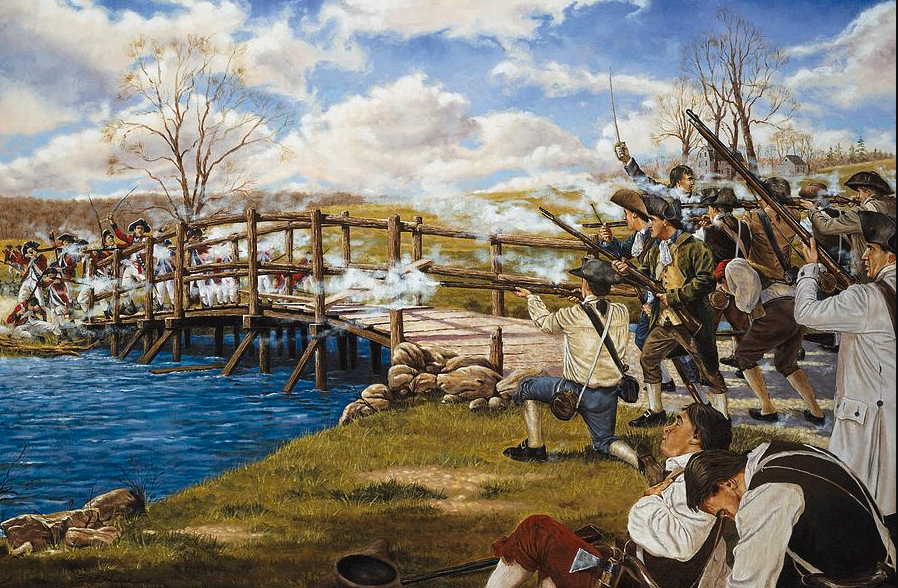“For God’s sake, fire!”
– Major John Buttrick of Concord, Massachusetts Bay Colony
April 19, 1775
After departing Boston late in the evening of the previous day, the British are on the march to Concord with the objective of seizing colonist weapons and munitions. This is an attempt by General Thomas Gage to quell mounting rebellion. Commanders John Pitcairn and Francis Smith lead the companies of troops. The village of Lexington lies in their path.
5:00 AM, Lexington
Hearing reports of 500 armed men mustering in Lexington, Pitcairn gallops to the front. Upon arriving, he estimates there are closer to 200 men at arms on the village’s common. He commands his troops to disarm and disperse these men, but not to fire unless ordered to do so.
The Minutemen, led by Captain John Parker, are formed up on the town’s common with muskets on their shoulders. All-in-all, there are around 70 men mustered (not 200 as Pitcairn estimated). The Minutemen are to hold their ground but not to fire. Amid mounting pressure from the British, Parker orders the men to disperse but not lay down their weapons.

As the British move forward, the militia men begin to back down. Just as Pitcairn believes the situation is deescalating, a shot rings out. Though it is unclear where the shot came from, the nervy British soldiers let off a volley into the dispersing men. Pitcairn calls for order, but the lid’s been blown off. As the British column moves on from Lexington to Concord, the common is left with eight dead or dying colonists. The other men, including Captain Parker, are able to escape.
8:00 AM, Concord
After plowing through the militia at Lexington, the British soldiers continue on to Concord. Once there, Pitcairn and Francis Smith order around 220 troops to secure the north bridge over the Concord River. By the time they arrive, nearly 400 militia from Concord and the surrounding area are gathered on the high ground.
From their vantage point above the town, the Minutemen see smoke rising. They wrongfully believe this is from the British setting ablaze Concord. This leads Lieutenant Joseph Hosmer to say, “Will you let them burn the town down?” This galvanizes the men into action. The Minutemen form up and, led by Captain Isaac Davis, proceed to march down the hill towards the bridge.

Intimidated by the militia’s numbers and orderly advance, the British fall back to the other side of the bridge and prepare to defend themselves. Once Davis and his men are within range, the British open fire, killing Davis among others. The British likely hoped the militia would disperse as they did in Lexington.
But that was not to be the fate of the day. After a stunned moment of hesitation, Minutemen Major John Buttrick shouts, “For God’s sake, fire!” The men reply with a rapturous volley that kills three British troops and wounds nine others in what is later immortalized as “the shot heard round the world.”
Battle Road
Pitcairn and Smith see the writing on the wall and soon order the troops to return to Boston. However, the retreat turns into hell. Upon seeing the British fleeing, thousands of militia men swarm the troops from all sides along what is now called Battle Road. Shots ring out from all directions.
As the British reach Lexington again, Captain John Parker and his men lie in wait. From behind cover, the Minutemen of Lexington fire upon the British. John Parker has his revenge.

Hearing that fighting had broken out, Gage orders Lord Percy to depart from Boston with a relief column. The column meets Pitcairn and Smith on the eastern outskirts of Lexington. The British continue a covered retreat to Boston, all the while receiving return fire from the angry colonists. As the British retreat finally finds safety by way of cannons on their men o’ war, it is clear the day has been a disaster.
In total, 73 British troops are killed with many more wounded. By contrast, the colonists lose only 49 killed. The psychological impact is much greater than the loss of men, however. The colonists stood up to the greatest military in the world and won the day. The American Battlefield Trust puts it well, “On April 19, 1775 they were simply loyal British subjects who believed that they were standing up to defend and fight for their rights. In doing so they changed the world forever.”
The Lexington Reenactment and Concord Parade
The year 2025 marks the 250th anniversary of the Battles of Lexington and Concord. Both cities have great events planned to commemorate the occasion. At 5:00 AM on Saturday April 19th (they take the accuracy seriously!), Lexington will host the Reenactment of the Battle of Lexington. At 8:30 AM, Concord will host The Patriot’s Day Parade. The towns have many other events planned too.
I had the privilege of visiting both Lexington and Concord in the summer of 2024. When you visit Boston, I highly encourage you to visit both towns. They each do a tremendous job highlighting these momentous events in American history.
Although the 250th anniversary is a big deal, both the reenactment in Lexington and parade in Concord are an annual event. Sounds like another history travel bucket list item!
Related Posts:
The Freedom Trail: A Great Way to Exercise Your Body and Mind
A Fun Way You Can Recreate Paul Revere’s Ride
How Well Do You Know the Revolution?: A Timeline
Samuel Adams: The Man and the Beer
